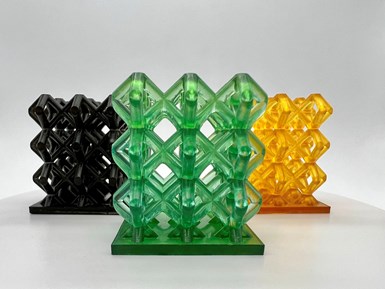PolySpectra’s COR Bio Resin for End-Use Health Care, Consumer 3D Printing
COR Bio features a combination of toughness, biocompatibility and autoclavability, which are critical characteristics for end-use health care and consumer applications.
PolySpectra, maker of rugged photopolymer resins, has developed its third Cyclic Olefin Resin (COR) material, COR Bio, its first biocompatible 3D printing material for durable 3D printing.
“COR Bio is polySpectra's latest resin, designed specifically to unlock previously impossible health care and consumer applications for photopolymer 3D printing,” says Raymond Weitekamp, Ph.D., polySpectra founder and CEO. “COR Bio features an unprecedented combination of toughness, biocompatibility and autoclavability — a critical triad for end-use medical device applications.”
The third COR material marks polySpectra’s entry into new markets. Beyond the flagship industrial opportunities for rugged COR Alpha and COR Black resins, COR Bio unlocks applications in a number of key application areas, including end-use part production for health care, medical device components, dental products, surgical tools, consumer products, podiatry/orthotics, and milli- and microfluidic devices
“The chemistry behind COR Bio has been in development for many years, with direct input from Fortune 100 customers in health care, medical devices and biotechnology,” Weitekamp says. “We are tremendously excited to bring this powerful technology to the general public, which we hope will accelerate innovation in these critical industries.”
With proven flagship technologies compatible with both industrial and, more recently, desktop DLP/LCD 3D printers, COR materials bring additive manufacturing to true production quality. COR Bio now brings these qualities, in a biocompatible and autoclavable formulation to new markets. It also offers high impact strength, a high working temperature and biocompatibility, while offering best-in-class polar fluidic compatibility. Especially of interest, COR Bio features physical properties such as 135°C glass transition temperature (Tg) as well as 100% elongation at break.
As part of the polySpectra COR portfolio, COR Bio is compatible with supaRinse washing fluid for postprocessing. All three COR portfolio materials are available for order in both 385nm and 405nm formulations.
- Listen to this episode of AM Radio to hear about highlights from Formnext 2022, including parts printed from polySpectra COR resin.
- Read this article about polySpectra reformulating its rugged resin for use with desktop 3D printers. COR Alpha was previously available solely for use on 385-nm wavelength 3D printers, limiting use to industrial hardware. The new formulation expands availability to 405-nm wavelength systems.
- Learn why high-performance materials supplier polySpectra is embracing augmented reality with a new tool called Massless, which is intended to reduce unnecessary 3D printing.
Related Content
-
3D Printed PEEK Spine Implants in Production: The Cool Parts Show Bonus
Curiteva is using Fused Strand Deposition to produce two different lines of FDA-cleared spine implants. We visited the company’s Huntsville, Alabama, facility to learn more.
-
8 Cool Parts From Formnext 2023: The Cool Parts Show #65
New additive manufacturing technologies on display at Formnext were in many cases producing notable end-use components. Here are some of the coolest parts we found at this year’s show.
-
Ice 3D Printing of Sacrificial Structures as Small as Blood Vessels
Using water for sacrificial tooling, Carnegie Mellon researchers have created a microscale method for 3D printing intricate structures small enough to create vasculature in artificial tissue. The biomedical research potentially has implications for other microscale and microfluidics applications.















